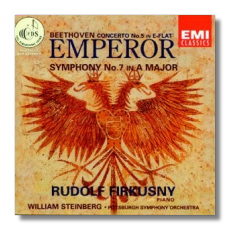
The Internet's Premier Classical Music Source
Related Links
- Beethoven Reviews
- Latest Reviews
- More Reviews
-
By Composer
-
Collections
DVD & Blu-ray
Books
Concert Reviews
Articles/Interviews
Software
Audio
Search Amazon
Recommended Links
Site News
 CD Review
CD Review
Ludwig van Beethoven

- Concerto for Piano #5 "Emperor" in E Flat Major, Op. 73 (1809)
- Symphony #7 in A Major, Op. 92 (1812)
Rudolf Firkušný, piano
Pittsburgh Symphony Orchestra/William Steinberg
EMI Classics 66888 ADD part monaural 75:50
As Dante bridged the medieval and modern world, so did Beethoven the worlds of classical and romantic music. He has one foot firmly in each. In some ways you can view interpretations of any of his works as favoring one leg or the other. This is the case in both of these pieces on this "should belong in any serious listener's collection" disc.
The "Emperor" is arguably the most perfect piano concerto ever written. (Please note I said 'most perfect' not 'best';-) My first exposure to it was from an LP my father had in his collection. It was unusual because it was on the DG label and in the later 70s there was only one shop in all of Cowlumbus, Ohio that carried those expensive "imports". William Kempff was the pianist and Leitner conducted the Berlin Philharmonic [DG 447402]. I have that in my personal collections of recordings and it was one of the discs I considered in writing this essay. That recording is an instance of what I call the "more classical" facet. Lines are ever so slightly more tightly drawn, the sound is dryer, the tempi just a shade faster.
I prefer the Firkušný/Steinberg "more romantic" lean. The sound of the piano is richer, fuller, has more body and resonance. The performance is certainly NOT laid back, but it is more mellow, more romantic a tilt. (Yes, if you catch the puns, they are intentional) Frankly, I do not think that Firkušný was ever capable of anything less than a poetic performance, even when at his most dramatic, as in this concerto. If you have not heard Firkušný, this disc would be a marvelous introduction. (The performance was issued, a few years ago, on this same label's Seraphim series. The sound here is significantly better. On the other hand, the Seraphim also has the piano concerto #3, which I confess I would have preferred over the symphony. I know another digression.) Steinberg's Pittsburgh band is no slouch, either. I cannot find any qualitative difference in sound or performance. As I said, the DG recording is slightly dryer, but not in any negative way. The orchestra is fiery when needed, poetic when warranted, and sounds rich, with a nice bass line. While I will keep the Kempff for reference, and prefer it on some occasions, this Firkušný issue is almost my personal favorite.
Almost? Well, I have to confess to a somewhat perverse love of the Gould and Stokowski recording. Everyone who thinks they know this piece of music should hear that Sony issue (as far as I know only available in the complete set: Sony SM3K 52632 ). The opening chords tell you this is a ROMANTIC interpretation. Then the pianist comes in, and damn! Something is going on here and you don't know what it is. Then, too, you do. It sounds as if Gould is discovering and inventing this piece at the same time. It almost sounds like Beethoven's "Emperor" à la Glenn Gould's Bach. Does this compute? It is really impossible to put into words what Gould and Stokowski accomplish. You might hate it, but I revel in it.
The same kind of analogous reasoning applies to comparative listenings of the 7th Symphony. One of my favorites is Carlos Kleiber's on DG. Here, again, the sound is dryer, the lines just slightly more taut, the effect more classical. Steinberg's Pittsburgh Orchestra does not suffer by comparison with the VPO. Again, the orchestra responds dramatically and lyrically, more romantic in atmosphere. The sound is slightly more resonant but details are not smudged. Then we have my perverse favorite, Stokowski's London Phase-4 recording ( available only from Japan several years ago) This is etch romantic. The usual deep, firm bass line that is a hallmark of the Stokowski Sound is there. I love it. My all-time favorite recording is Stokowski's 1927 recording. There are those who will find it mannered, but I will listen to this any day before even considering Toscanini's recordings. Am I the only critic who finds Toscanini's reputation inexplicable? To my ears, his metronome steeple chase gutted the music of its heart. In fact, one of my comments about Kleiber's recording was, "Toscanini with soul."
So, I think that I can safely recommend this disc to any serious lover of Beethoven. It has been awhile since I've listened to any Beethoven. I am reminded, again, just how much good stuff he wrote. Next on to more Beethoven: piano sonatas and the "Eroica".
Post Script: Another recording of the "Emperor" I like very much is Robert Casadesus and Hans Rosabaud with the Concertgebouw Orchestra. This 1961 recording was one of my first purchases on an Odyssey label. It appeared on a Philips CD (426-106) in 1989. I strongly recommend this, too, as another insight to this masterpiece. I am not sure, but I don't think it is currently available.
Copyright © 1999, Robert Stumpf II


















